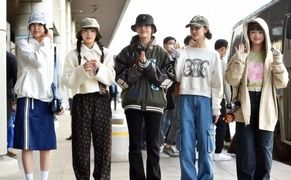 |
| President Yoon Suk-yeol and first lady Kim Keon-hee get off the presidential plane after their state visit to the United States at Seoul Airport in Seongnam on April 30, 2023./ Source: Yonhap |
AsiaToday reporter Lee Wook-jae
President Yoon Suk-yeol’s state visit to the U.S. is said to have greatly enhanced Korea-U.S. alliance cooperation and improved the security environment on the Korean Peninsula as it was confirmed in the Washington Declaration.
Analysts say it is one of the best achievements compared to the results of previous presidential visits to the U.S., considering economic achievements such as investment worth 8 trillion won in Korea, reconstruction of future-oriented alliance cooperation on military, high technologies, education, and culture, and confirmation of trust between the leaders of the two countries.
The biggest achievement of Yoon’s recent visit to the U.S. is the adoption of the Washington Declaration. Under the deal, the allies agreed to deploy a U.S. strategic nuclear submarine, one of the United States’ major nuclear forces, on the Korean Peninsula, which is said to be significant as South Korea has added another strong deterrence against North Korea. The establishment of the Nuclear Consultative Group (NCG) can be seen as a preview of the strong alliance between the two countries.
Some criticize that Yoon’s reaffirmation of the Nuclear Non-Proliferation Treaty (NPT) as officially abandoning its nuclear weapons program, but some say that the reconfirmation of compliance with the NPT was the best option for the country, which already joined the treaty in 1975.
The largest economic business delegation that accompanied the president attracted a considerable amount of investment. It is considered the result of Yoon’s efforts as he pitched himself as South Korea’s “No. 1 salesperson.” The country attracted $5.9 billion (approx. 7.9 trillion won) from a total of 8 companies, including Netflix, and 50 MOUs have been signed.
The expansion and diversification of bilateral cooperation is also drawing attention. The two leaders’ declaration of friend-shoring in high-tech industries such as chips, electric vehicles, and batteries, and the fact that this investment attraction and MOU signing are concentrated in high-tech industries are considered symbols of expansion of future-oriented partnerships.
Other important achievements include the launch of a dialogue for next-generation emerging and core technology between the U.S. National Security Council and the Korea Office of National Security, space and quantum science and technology cooperation platform between related organizations, and special exchange programs for young people in science and engineering (STEM).
In addition, the two leaders reaffirmed their willingness to closely consult on creating a favorable business environment on the Inflation Reduction Act (IRA) and the CHIPS and Science Act.
#Yoon Suk-yeol #Joe Biden #alliance
Copyright by Asiatoday
Most Read
-
1
-
2
-
3
-
4
-
5
-
6
-
7





















